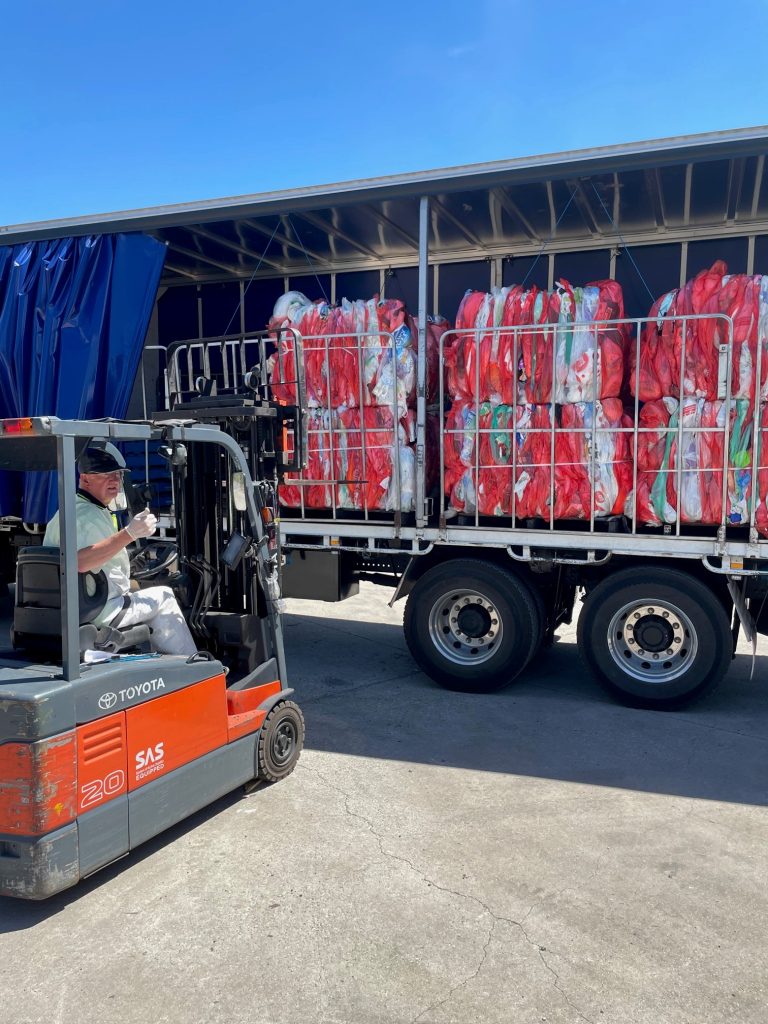Sustainability in Action
Close the Loop – Updated Facility & Soft Plastics Processing Line Launch

Close the Loop are at the forefront of Australia’s transition to a circular economy, collaborating with strong, like-minded industry, government and brand partners to divert materials from landfill and create high-value recycled products.
From February 2024, we’ll be recovering and recycling higher volumes of complex material streams from industry, retailer and council partners through our updated Melbourne facility, while manufacturing high-value recycled plastic products that will be bought-back and used by our partners to truly “close the loop”.
With the upgraded machinery installed, Close the Loop boosts capacity for transforming post-consumer soft plastics and toner powder into high-value recycled products such as TonerPlas®- our asphalt-improvement agent that creates more sustainable roads, as well as utilising packaging waste for our recycled plastic injection-moulding resin rFlex®- allowing materials to go back into tertiary packaging items such as pallets, crates and tubs.
All this with Australian technology, and zero waste to landfill.
The launch of the new CTL facility will mark an important milestone in the expansion of Australia’s soft plastic recycling capacity, which is expected to play a pivotal role in supporting the relaunch of soft plastic collections. The Soft Plastics Taskforce made up of major supermarket retailers welcomes the launch and the contribution it will make.

With councils such as The City of Greater Bendigo offering drop-off recycling points for soft plastics, and the roll out of new retail drop-off locations expected in the first half of 2024, the community will have increasing opportunities to engage with soft plastic recycling once more.
More about Close the Loop’s soft plastics recycling development:
Close the Loop has worked tirelessly for over 20 years to develop processes, products and markets for complex plastics streams with a deep determination to lead industry towards a more circular economy.
Our flagship product, TonerPlas® is an engineered asphalt additive made entirely from recycled post-consumer soft plastics and reclaimed toner powder (plastic) from print consumables. As the world’s largest recycler of print consumables, Close the Loop are supported by the leading global print brands who allow us to offer free collection and recycling programs across the globe for print cartridges and other consumable products.
Infrastructure company Downer has partnered with Close the Loop in order to determine how TonerPlas® and other waste products could be repurposed into valuable inputs for asphalt products, while replacing virgin materials in the process. Following over seven years of research and development, Reconophalt was developed . Reconophalt is a perpetually recyclable asphalt that contains TonerPlas® in addition to other waste materials that would otherwise go to landfill, such as:
- waste glass destined for landfill or indefinite stockpiling
- reclaimed asphalt pavement from end-of-life roads
- crumb rubber from end-of-life tyres
- coarse aggregate and sands from street sweepings
One kilometre, two-lane road paved with Reconophalt will repurpose and divert from landfill approximately:
- 101,000 glass bottle equivalents
- 597,000 plastic bag equivalents
- waste toner from 17,400 used printer cartridges
- 202 tonnes of recycled asphalt pavement
TonerPlas® improves the performance and longevity of asphalt roads while lowering the carbon footprint. The most recent success includes being used in Melbourne’s M80 and Monash Freeway Upgrade Projects in partnership with The Victorian State Government, CPB Contractors and Downer.
The Australian-designed, Australia-made recycling technology used by Close the Loop to process soft plastics and toner into TonerPlas® will be duplicated into at least 3 other locations in Australia in the near future, and contribute as an important part of the solution for recycling problematic plastics in-line with targets outlined in the federal government’s National Waste Policy and Action Plan.


Global Reach
-
Australia
Visit Site -
New Zealand
Visit Site -
United States
Visit Site -
Europe
Visit Site
